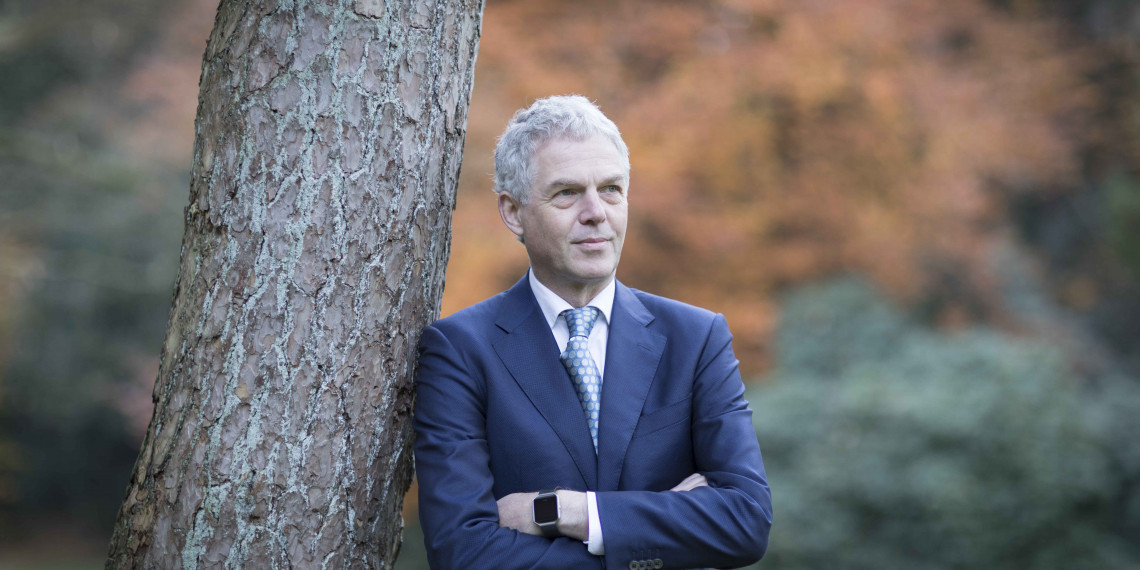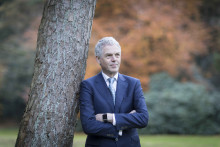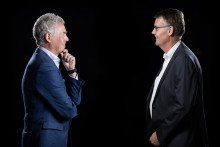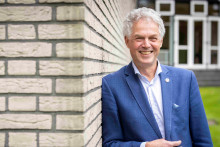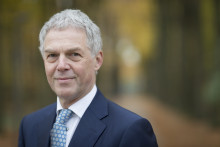These are unprecedented times, not least for those leading a university during this period. The biggest dilemma that Palstra faced? The rector does not hesitate. ‘The first decision we made: cancellation of the open days in March.’
Initially, the open days ‘simply’ went ahead. Aspiring students came to the campus in large numbers, where they listened to Director of Education Stefan Kooij’s opening address in a lecture hall. ‘Prior, I asked Stefan whether he still felt comfortable with the situation. He did. More stringent government measures were announced in The Hague during his opening speech. We had to cancel after all. Stefan welcomed everyone in his speech and in the same speech, he sent them home. A bizarre situation.’
‘We have been hearing that more and more from students and employees in recent weeks. When can we come back?'
Looking back on it now, Palstra does not regret the decision to allow the open days to proceed initially. ‘We were guided by the government’s protocols. The advice was: that the event could go ahead. How do you justify decision-making? That is what it’s about. We did that based on government advice. That gave us a strong basis. What’s more, I think it’s fine for the cabinet to be guided by the scientific knowledge of the National Institute for Public Health and the Environment (RIVM), as limited as that knowledge may sometimes be.’
Social cohesion
Although Palstra found the first corona-related decision difficult, the rector speaks about the crisis in a largely positive tone. He emphasises that this era offers new opportunities. ‘We are being offered a huge opportunity to give the university a push in the right direction. In addition to normal operational management, we are busy establishing a new university in my opinion. We are asking ourselves: what is important as a university? Professional expertise is obviously an important core value. But I also notice that social cohesion is greatly valued, especially during this time.’
By ‘social cohesion’, the rector is referring to the physical campus, which was often taken for granted prior to the corona crisis. According to Palstra, the (coincidental) meetings that take place there are critical to the UT community. ‘We have been hearing that more and more from students and employees in recent weeks. When can we come back? I miss the campus myself too. Physical meetings in particular have a highly motivational effect.’
Small scale and intensive
The question remains as to what perspective the Executive Board can offer students and employees who are missing the campus. For the time being, most buildings are only being used to a limited extent. ‘We are going to resume activities gradually. We first want to facilitate research and students who need to use the labs for graduation purposes. Activities in which students meet one another again will also be given precedence. We will have a strong focus on small-scale education from September.’
'I do not want to conceal the fact that there were also things that went wrong'
Palstra emphasises that events involving hundreds of people will not yet take place on campus from September. Large-scale lectures are therefore not on the cards yet, not physically anyway. ‘This is not what students and employees find most important either. I hear from students that above all, they miss daily contact with fellow students and lecturers. That is why we will be working on campus as much as possible again from September, but the emphasis will be on small-scale, intensive collaboration in accordance with the Twente Education Model (TOM). Our large campus offers a unique opportunity for that. It is with good reason that we have recently started referring to the UT as: the one-and-a-half-square-kilometre university.’
Digitisation
Nevertheless, digital education, which was a big hit in recent months, will continue to play a role in future. ‘If something works effectively online, why would we not keep doing it that way?’ The rector is impressed by the digitisation that took place out of necessity in recent months. ‘Great progress was made and a huge amount of work was carried out. If I compare it to mid-March, it exceeded all expectations. Our staff members were incredibly dedicated in their commitment to offer education online.’
According to Palstra, study delay has been limited to a minimum thanks to the dedication of employees. ‘Our impression is that study progress was able to continue virtually as normal, albeit digitally. There were difficulties, naturally. For example, online examinations are particularly challenging. UT has serious concerns about largescale implementation of proctoring software, technology that enables lecturers to monitor the digital habits of students remotely. I hear from students that they are largely positive about the way in which the tests were taken. At the same time, I do not want to conceal the fact that there were also things that went wrong.’
'It is a crossroads. A crisis can have a negative as well as positive outcome'
For example, an online Technical Computer Science test was declared invalid due to fraud. According to the rector, it was not the only incident; he categorically refers to ‘incidents’. ‘We expect responsible behaviour from our students. That is usually the case, but the message has not yet sunk in completely. For example, there is a difference between bachelor’s and master’s students. In the first year, students feel under a great deal of pressure to get all the necessary marks, even though binding study advise (BSA) have been deferred. They experience the resultant stress and that encourages certain types of behaviour. I am not condoning fraud. Where fraud occurred, it was picked up. Appropriate measures were then taken.’
Palstra points out that physical exams will return in the coming academic year. ‘The rapid transition to digital examinations resulted in an incredibly high workload, as did all the other aspects of online education. We must apply digitisation in a positive way. Where things must and can soon be done differently, they will be done differently. I am particularly impressed by the achievements. The quality of education has not declined. On the contrary.’
Crossroads
According to Palstra, research at the UT has by no means collapsed since the advent of the corona crisis either. ‘Naturally, many labs were closed, except for corona-related research. But that does not mean researchers have been resting on their laurels. I believe the corona crisis offered an excellent opportunity to reflect on one’s own research, for example: how can I make a bigger impact with my research?’
‘The term crisis is derived from the Greek, where it means something like ‘distinguish’ or ‘decide’. It is a crossroads. A crisis can have a negative as well as positive outcome. Either our research declines in quality, or we seize the opportunity to improve the quality of our research. The corona crisis offers opportunities to explore new options and to seek new partners.’
'I am pleased that I can play a role in directing the university, particularly in difficult times'
Palstra desires this agility from UT doctoral candidates too. ‘It was a huge, sometimes exceptionally difficult switch for our PhDs, but I am confident that they were able to work on important aspects of their doctoral research during the corona crisis, albeit in a different way at times. For example, literature research or writing articles. This crisis does not mean PhDs will necessarily encounter delays, provided they respond to the unexpected events of recent months with flexibility. It is ultimately about testing aptitude: are they capable of conducting research efficiently? This criteria is qualitative, not quantitative.’
According to Palstra, the corona crisis is also influencing the way science is conducted. ‘It depends on how society develops after the crisis, but I cannot imagine that we will continue as before. Less travel seems obvious. I note that new ways of meeting one another have already been devised in the scientific field so that collaboration can still take place. Digital conferences, for example. That is a positive development for sustainability.’
But what about international collaboration now that national borders are in fact being closed due to the corona crisis? ‘That is indeed an obvious risk. But I am convinced borders will not remain closed in future, certainly not as far as science is concerned, thanks to all the digital resources we now have at our disposal. Huge strides have been made in the scientific field within the European community over the past twenty years. This collaboration has produced many positive developments. Now we are going in search of new opportunities again, with the emphasis on sustainable alternatives.’
Departure
The corona crisis has come at a unique juncture for Palstra. After four years, he his handing over the baton to his successor during the Dies Natalis in November. ‘Whether I have been busy considering my imminent departure during the crisis? No. I cannot say much about it. I had already decided not to serve a second term before the crisis. I want to be more engaged in science again. The corona crisis has not changed that. What’s more, my departure as rector does not mean I am leaving the UT, but I still need to work out the finer details.’
‘Naturally, this crisis period is a unique experience for a director. I am pleased that I can play a role in directing the university, particularly in difficult times. It provides a great deal of satisfaction. I have always enjoyed doing it and that feeling has only grown stronger during this crisis period.’


